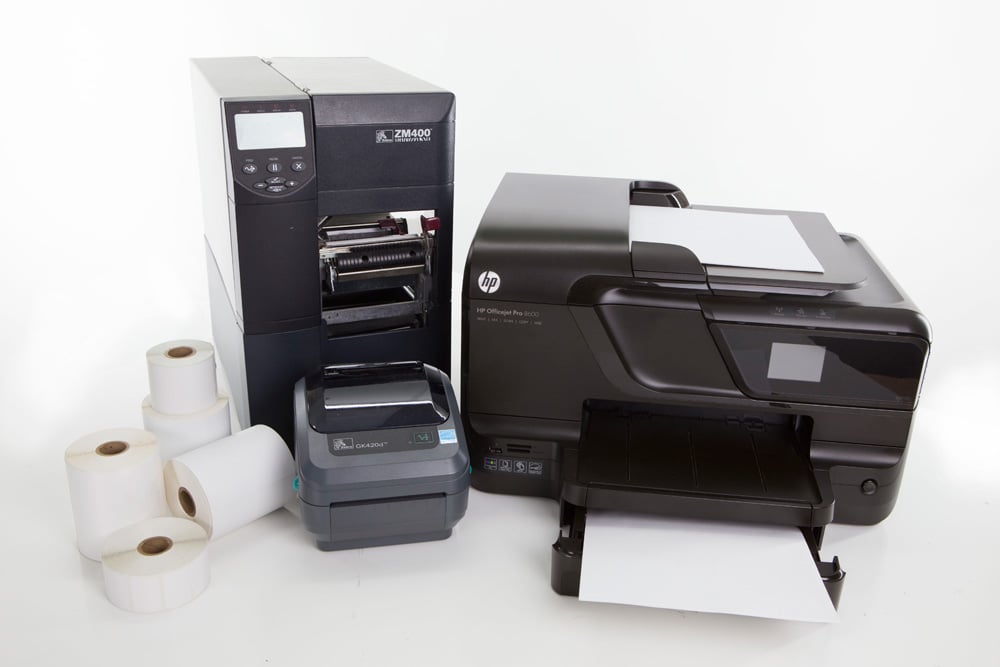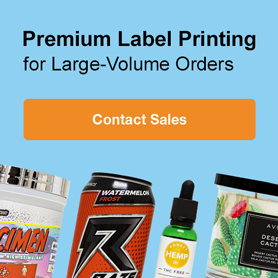Sheet Labels vs. Roll Labels: What's the Difference?

There are a million and one uses for labels: shipping labels, product labels, filing labels, organization labels, scale labels, name tags, and the list goes on.
With so many purposes, the label industry isn't one-size-fits-all. And yet, when you're shopping for labels, you're expected to know what you need. That's why we've written this guide – to help you see how label types differ and which ones fit your tasks and needs.
The Basics
You have two options when it comes to purchasing labels: sheet labels and roll labels. They function vastly differently and are typically used for entirely different purposes. Keep reading to learn more about each type.
Sheet Labels
Sheet labels are the label version of printer paper. They're intended for use with inkjet and laser printers. Sheet labels come in the traditional 8.5" x 11" paper size, as well as in large format configurations: 8.5" x 14", 11" x 17", and 12" x 18". You load them in your printer at home or work as usual, and voilà, you have printed labels.
Shop Sheet LabelsRoll Labels
Roll labels are labels in a rolled format. They can only be printed on using dedicated label printers (direct thermal printers, thermal transfer printers, or inkjet roll printers). The labels are spun around a cardboard spool and mounted inside the roll printer. When it's time to print, the machine feeds the label through and your printed labels come out one-by-one.
Roll labels for direct thermal and thermal transfer printers have two main sizes: 1" core and 3" core. They're different from inkjet roll labels, which require a 2" core or a 3" core.
Shop Roll LabelsLabel Printing Scenarios
To help you identify the best format for your labels, we've pulled out the most common situations and outlined which type of label will work best.
If each label has different content
For projects like barcodes, shipping labels, and name tags where each label is unique, it's faster and easier to use a roll printer. Dedicated label printers print labels out one at a time, so it's easy to customize the information on each label.
This is especially true if the content has varying lengths. Continuous feed roll labels are perfect when each label will be a different size.
If you're printing the same information on each label
For things like return address labels, it may make more sense to go with label sheets. While roll printers are faster on a per-label basis, in the long run, filling a sheet with the duplicated design and printing as many sheets as you need may take up less of your time.
If you want to print in full color
For full color designs, the majority of the time you'll want to go with sheets. Inkjet and laser printers are ideal for incorporating color logos, images, and/or photographs.
The exception to the rule is if you own an inkjet roll printer. Inkjet roll printers are different from the other roll printers out there which typically only print in black and white. These are capable of printing 16.7 million colors. Learn more about inkjet roll printers and why you should make the switch.
If color isn't as crucial
Go with rolls. Direct thermal printers only print in black and white, so if color doesn't matter, you'll save money on the ink and toner they don't use. They're also highly resistant to smudging and smearing since there's no wet ink involved.
If you do want a touch of color, though, thermal transfer printers can still be a good choice. They have the ability to print in color with the addition of a colored ribbon. However, you can only print in the color of that ribbon.
If you want a variety of shapes and sizes
Lucky for you, with OnlineLabels, you can have your cake and eat it, too. We offer a wide variety of label sizes and shapes in sheets and a comprehensive selection of label sizes and shapes in rolls.
In the off chance you don't see what you're looking for, we can make it for you. Create a custom roll label or custom label sheet.
Our selection and dedication to your project are just two of the many reasons OnlineLabels.com is better than retail.
If you want it to last longer
Thermal transfer printers are especially applicable for this scenario. Because thermal transfer printers work by melting a ribbon onto the label surface, their byproducts aren't affected by light or heat (unlike direct thermal labels). They can even withstand contact with chemicals. Common applications for lifelong labels are product identification, inventory, and asset labeling.
Learn how to choose a ribbon for your thermal transfer printer.
If you want a variety of materials and colors
One major benefit to using sheet labels is our selection of material types. We stock over 35 unique material types for sheets, whereas roll label materials are not as extensive. (Check out our roll label materials though, while you're at it.)
Such an extensive collection of material types opens the door to all kinds of special applications: labeling products that come into contact with water, making high-end metallic labels, and designing your own cigar wrappers, to name a few.
From neons to pastels, glossy finishes to matte, you can definitely let your imagination run wild with sheets.
Want a specific color? We can do that, too. Order custom color labels.
If speed is a necessity
Roll printers eliminate the time-consuming element of printing labels. Roll printers can print a large number of labels in a short amount of time, some as high as 70 labels per minute.
If you don't want to spend a ton of money on ink
Fun fact, printer cartridge ink is one of the most expensive liquids in the world. We don't blame you for wanting to cut out this costly expense. As we mentioned earlier, dedicated label printers don't rely on ink to produce their labels, so they're definitely the way to go here.
Having said that, laser printers don't use ink either. They use toner, which is also less expensive. You'll certainly experience some cost savings here, but not quite as much as roll printers yield.
If you are printing in quantities upward of 500
If you're printing in bulk, you have two options: print on rolls or outsource the printing. The cost-per-label is significantly lower for roll labels and they're substantially faster at the actual printing process.
Your other option is to have us do the printing for you on our industry-leading printers. If you decide to do custom printed labels, whether custom sheets or custom rolls, we'll print your designs and send them straight to your doorstep.
If you're printing a couple at a time
Roll labels reduce waste. We know it can be frustrating trying to line up your content with the blank labels left on a half-used sheet. And if your printer is misaligned, you may have just wasted what blank labels you had left. With roll labels, you can print only the labels needed for your job, on-demand.
If you use labels for shipping
Our sheet and roll labels are both perfect for printing shipping labels. We created several shapes and sizes to fit with a variety of different shipping applications. For example, we have a configuration for FBA shipping labels. Browse sheet shipping labels.
If you're short on space
Roll label printers are much more compact than traditional home and office printers, think toaster oven sized or smaller. It isn't unimaginable to consider adding one to your printer stockpile. It probably can't replace all the printing you do, but it will definitely carry its weight.
If appearance is everything
Sheet labels are a great option to add a professional look to your packages. The ability to print them in full color and on a variety of materials like silver foil or matte can really add a touch of class to your packaging.
On the flip side, inkjet roll label printers like Primera Color Label printers produce brilliant high resolution, full-color labels.
If you want to be cost-effective
Roll labels are generally cheaper. The more you use them, the more this value is seen. After a while, your investment in one will have paid for itself. In fact, roll labels are one of the best options for streamlining high-volume printing.
If you want to outsource
Don't want to worry about ordering a new printer, lining up your labels, or having to purchase more when your supply runs out? Take the hassle out of it, send them our way and we'll be happy to print them for you with custom labels. After a few days, your professionally printer labels will be ready to put to good use.
If you have a label applicator machine or want to invest in one
Is your business selling enough merchandise to warrant a label applicator? High-quantity labeling machines rely on rolls for quick and easy application. However, if you're using a small-scale application system, like those for CD labels, either option will work.
If quality control and consistency are important
When your printer starts to run low on ink, you may be able to tell in the printed results. You can avoid this issue with direct thermal and thermal transfer roll printers. They print one label at a time with resources that never diminish.
If you're printing product labels
This question goes hand-in-hand with whether you're printing identical versions of your label or variations of it. If you're printing identical ones, go with sheets. It's easy to set up and you have a pile of printed and ready-to-use labels at your disposal. If every label is different, you'll want to print them in an order that makes sense to you and only when you need them, in which case a dedicated label printer and rolls may be the best decision.
In certain instances (like with Amazon FBA, for example), you can pay companies to label your inventory for you. But for those who aren't willing to pay that extra fee, printing yourself is just as easy and more economical. Look through our Labels by Use section to find sheet labels for common products and containers, or look on your own in the Shop by Size category.
For rolls, select your printer from the three compatible options and then look at what we have to offer. Remember, if you don't see what you're looking for in either category, talk to us about making a custom one.
Next Steps
After reading the information above, we hope you have a better understanding of sheet labels vs. roll labels. When you're ready, use the buttons below to shop the best labels for your project.
Shop Sheet Labels Shop Roll LabelsIf you're ready to invest in a roll printer, use our quick breakdown of direct thermal vs. thermal transfer as a guide. We also dive into two of the most popular brands on the market: DYMO® and Rollo®.
Regardless of your label needs, business size, or printer type, OnlineLabels.com can provide you with the perfect sheet or roll labels for your unique application. Feel free to call our award-winning customer service team at 1-888-575-2235 for one-on-one support.
Once you've got the label part figured out, make sure the design lives up to your vision. Use Maestro Label Designer to create designs unique to your label specifications.
Want your labels custom printed? Submit your design to us and have us print on sheets or rolls.



